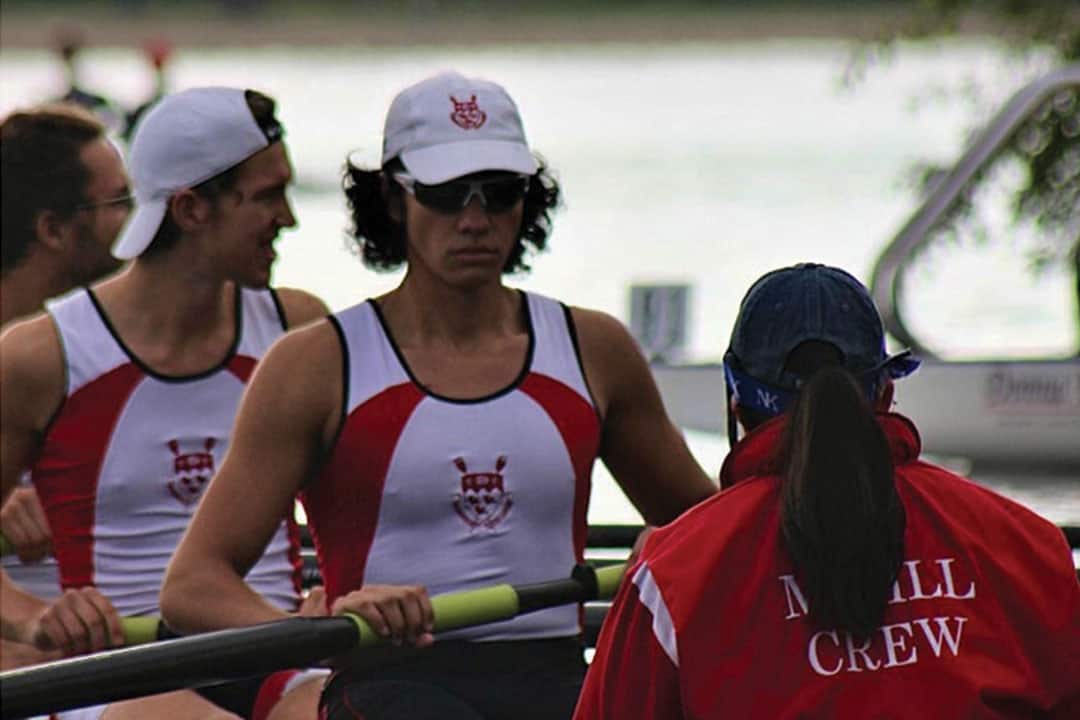Stepping outside of your comfort zone: for most, the act seems daunting. For rower Tomas Jirousek, a member of the Blackfoot confederacy of the Kainai nation of Southern Alberta — and someone who has been out of his comfort zone for most of his life — it’s child play.
As a second-year law student and Varsity Blues rower, Tomas has already made an impact on the athletic and academic community here at U of T. However, his journey to becoming a great rower at one of the best law schools in the country was not an easy one. It was even harder considering there were few people that looked like him in the spaces that he entered.
Jirousek started rowing at McGill University while pursuing an undergraduate degree in political science. He displayed significant talent right off the bat. In his first year at McGill, he had the opportunity to represent the province with Team Quebec in the Canada Games, leading a fourth-place finish in the men’s eight. The race was in Montréal, and the team was ready for it — except for one minuscule detail. Jirousek, the stroke rower, barely knew French.
In retrospect, he deems that experience as one of the greatest accomplishments of his rowing career, despite the language barrier that he had to overcome. Jirousek explains how the boaters got into a fishy situation in the middle of the race: “We were at our opening heat at the Canada game and we were between Ontario and Alberta. We got off the starting line pretty well but we’re drifting toward Manitoba… Without thinking, I make a call to my teammates, ‘Plus fort aux bâbord!’ But it was the direction. So instead of going the way I thought, all of a sudden our boat starts going the other way.”
Despite the French curse words that were making their way around the boat, the team made it out of their heat and was able to capture fourth place. Jirousek said that the Canada games were “one of the best experiences of [his] life.”
Jirousek has also been a social activist since his time as an undergraduate student. When he was at McGill, he led the campaign that changed the derogatory name of the McGill sports teams to the “McGill Redbirds.”
The idea for the campaign started during the times when Jirousek felt uncomfortable participating in athletics under the old name, which was tied to harmful and stereotypical depictions of Indigenous peoples. His efforts resulted in a rally on the McGill campus on October 31, 2018, where students chanted, “Change the name!” After a persistent effort by Jirousek, McGill finally announced that it would drop the name. “It snowballed into something bigger than I ever expected,” Jirousek said.
The success of the campaign was formative in Jirousek’s decision to pursue law school at U of T. However, law is something that has been on his mind from a young age. “My grandparents struggled with the legal system. When [my grandparents] were born, they couldn’t hire a lawyer… I wanted to do them justice by going into this field.” He noted that the campaign against the old team name made him realize the actual difference that he could make.
Despite Jirousek’s efforts, and universities’ attempts to make their spaces more inclusive, Jirousek said that in many of the spaces he encounters, he doesn’t see anyone else who is Indigenous. “I’m the only Indigenous person on the rowing team both at McGill and at U of T,” he added.
Jirousek said that financial limitations prevent Indigenous students from pursuing athletics. “Varsity rowing [is] an expensive sport… it needs to be more heavily subsidized,” he argued.
Jirousek explained that since social services are underfunded on Indigenous reserves, many families have to spend money on things that would otherwise be public goods, therefore leading to less disposable income. Offering scholarships, or subsidies as a way for Indigenous families to “get over the financial burden of playing a sport” could help inclusivity, he said.
While Jirousek is an attendee of one of the top law schools in Canada, he still sees sports as one of the most important aspects of his life. “My grandma used to tell me, sports is a kind of a medium where you shed racial barriers. You step on the water and despite everything else, the money, the politics… it’s just you and them. Nothing else. Just how quick you can push, how quick you can race — and I loved that about the sport.”
Jirousek continued, “[When] no one looks like you… it’s scary. But people are nicer than they seem. It’s easier once you get involved… Being a varsity athlete is amazing. It’s been transformative for my life.”
Much like varsity athletics have transformed his life, the stories of Tomas Jirousek could be transformative to many student athletes that come after him. So follow his example! Go out there and grab a ball, a stick, or a paddle — you never know what you’ll accomplish.


